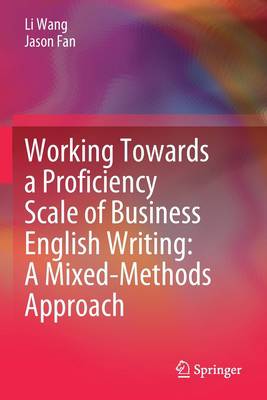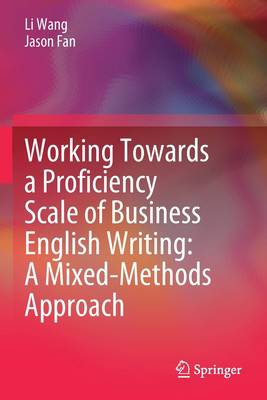
- Afhalen na 1 uur in een winkel met voorraad
- Gratis thuislevering in België vanaf € 30
- Ruim aanbod met 7 miljoen producten
- Afhalen na 1 uur in een winkel met voorraad
- Gratis thuislevering in België vanaf € 30
- Ruim aanbod met 7 miljoen producten
Zoeken
Omschrijving
1 Core Issues in Business English Education 1.1 English as a Lingua Franca for Business Communication1.2 The Importance of Business English Writing Skill1.3 Business English Teaching and Learning in China1.4 Problems and Challenges of Business English Education in China2 Assessment of Business English: The Role of Language Proficiency Scales2.1 Language Proficiency Scales 2.1.1 Definitions2.1.2 Origins2.1.3 Functions2.1.4 Impact2.2 The CEFR and Business English Tests 2.2.1 The CEFR2.2.2 Use of the CEFR2.2.3 Aligning Business English Tests to the CEFR: Potential Problems 2.3 Scales of Business English Proficiency: A Critical Evaluation 2.3.1 The ELTDU Stages of Attainment Scale2.3.2 The ALTE Framework 2.3.3 The ESU Framework 2.3.4 The International Second Language Proficiency Ratings (ISLPR)2.3.5 The Canadian Language Benchmarks (CLB)2.3.6 Discussion3 Conceptualizing Business English Writing Proficiency 3.1 Business English in the ESP context3.1.1 What is ESP?3.1.2 Branches of ESP3.1.3 Categorization of Business English3.2 Genre as ESP Writing Competence3.2.1 ESP Conceptualization of Writing 3.2.2 The Concept of Genre 3.2.3 Genre in Three Traditions3.2.4 Genre in the International Business World 3.3 The Model of Genre Knowledge 3.3.1 Formal Knowledge 3.3.2 Process Knowledge 3.3.3 Rhetorical Knowledge 3.3.4 Subject-matter Knowledge4 Working Towards a Scale of Business English Writing 4.1 General Principles of EGP Scale Development 4.1.1 Objectivity 4.1.2 Consistency 4.1.3 Localization 4.1.4 Comparability4.2 Common Methods of Scale Construction4.2.1 Intuitive Methods 4.2.2 Test-based Methods 4.2.3 Performance-oriented Methods4.3 Business English Writing Scale Development: Considerations from the ESP Perspective4.3.1 Linguistic Features of ESP 4.3.2 Pedagogical Objectives of ESP4.3.3 ESP Assessment: Specificity and Authenticity4.4 Developing a Scale of Business English Writing: A Mixed-Methods Approach4.4.1 Research Design 4.4.2 Scale Development Phase4.4.3 Scale Validation Phase 5 The Initial Establishment of a Descriptive Framework5.1 Theoretical basis of the Business English Writing Proficiency: The Model of Genre Knowledge 5.2 Categories of Genre Knowledge from the Business English Writing Perspective5.2.1 Operationalization of Formal Knowledge 5.2.2 Operationalization of Process Knowledge 5.2.3 Operationalization of Rhetorical Knowledge 5.2.4 Operationalization of Subject-matter Knowledge5.3 Categories of Business English Writing Activities5.3.1 A Review of Genres for Business Written Communication5.3.2 Selection of Genres for Framework Incorporation6 Creating a Descriptor Pool 6.1 Collection of Descriptors of Business English Writing Proficiency 6.1.1 Document Review6.1.2 Teacher Workshops6.1.3 Initial Categorization of the Descriptors6.2 Refining Categories of the Descriptive Scheme6.2.1 Key Issues Raised in Category Distinctiveness6.2.2 Selection and Revision of the Scale Categories 6.3 Quality Control on the Descriptors6.3.1 Key Issues Raised in Descriptor Formulation 6.3.2 Selection and Revisi
Alleen bij Standaard Boekhandel
+ 427 punten op je klantenkaart van Standaard Boekhandel
Beoordelingen
We publiceren alleen reviews die voldoen aan de voorwaarden voor reviews. Bekijk onze voorwaarden voor reviews.












